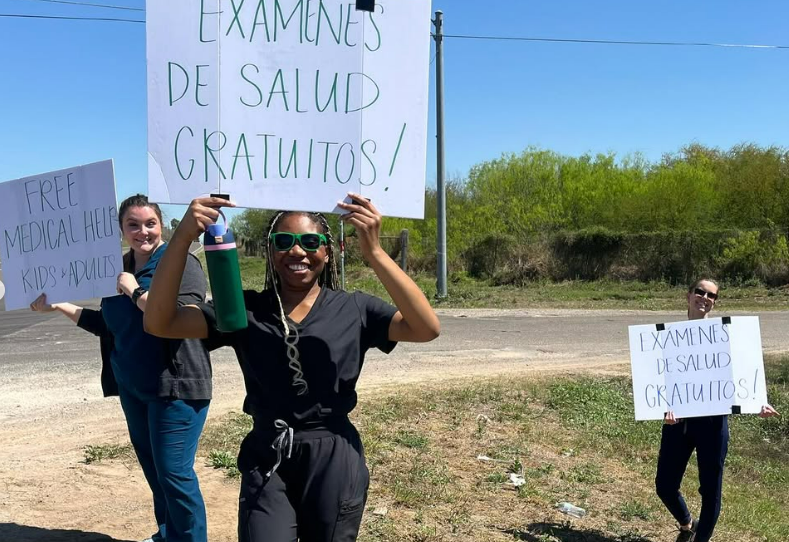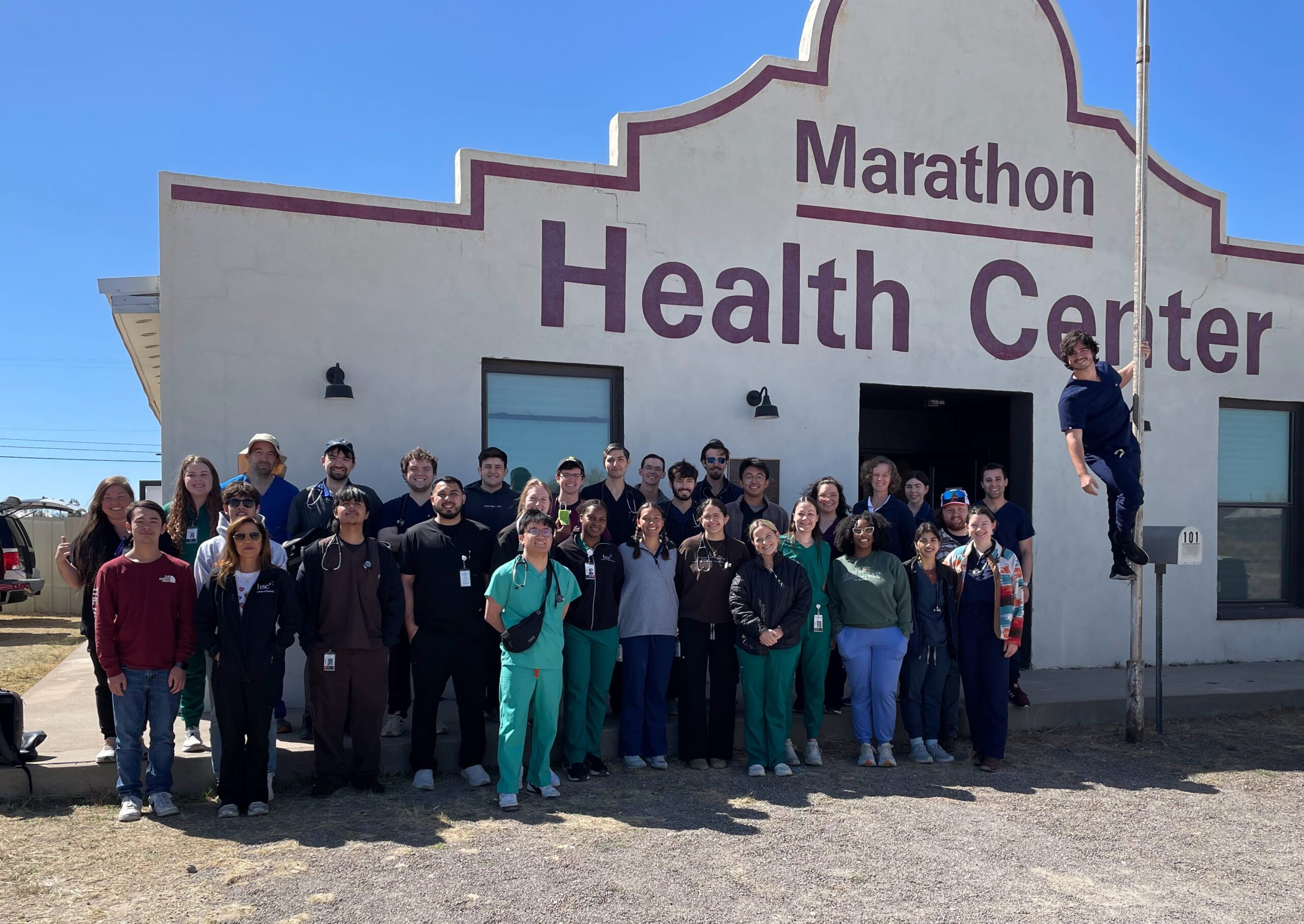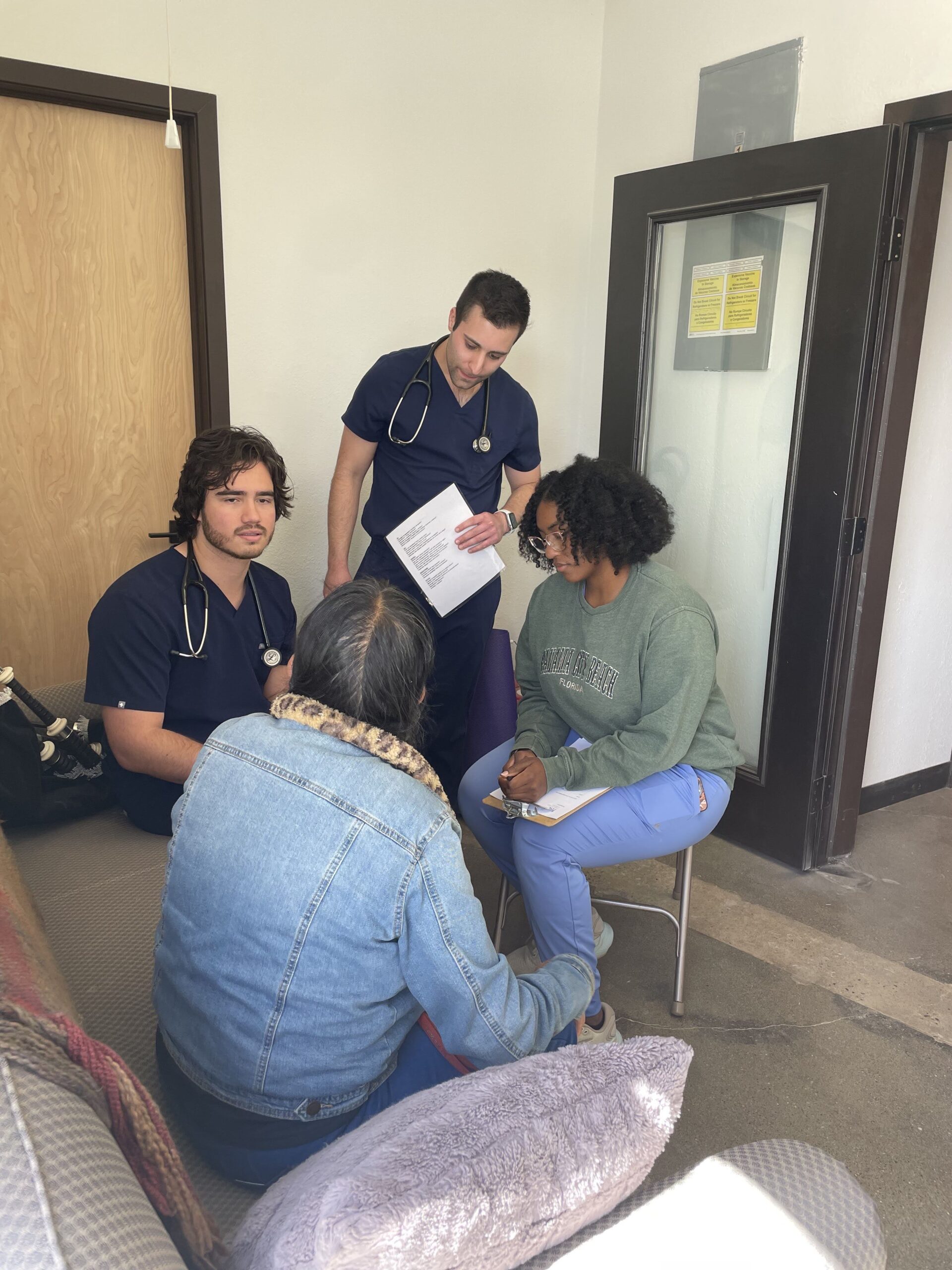Friday, April 11, 2025
 Three trips, thousands of miles and hundreds of students exporting health care from
Fort Worth to numerous locations in Texas and Guatemala on medical mission trips offering
free clinics to rural and underserved communities. More than 120 students and faculty
from the Texas College of Osteopathic Medicine (TCOM) at The University of North Texas Health Science Center at Fort Worth went to Sanderson, Marathon, Van Horn, Ozona in West Texas, McAllen, Mission and
Edinburg in South Texas, and Antigua, Guatemala.
Three trips, thousands of miles and hundreds of students exporting health care from
Fort Worth to numerous locations in Texas and Guatemala on medical mission trips offering
free clinics to rural and underserved communities. More than 120 students and faculty
from the Texas College of Osteopathic Medicine (TCOM) at The University of North Texas Health Science Center at Fort Worth went to Sanderson, Marathon, Van Horn, Ozona in West Texas, McAllen, Mission and
Edinburg in South Texas, and Antigua, Guatemala.
The trips encompassed many rural communities, giving students an opportunity to practice their clinical skills, but also exposure to patient populations that sometimes have gone years without seeing a physician.
The trip to Guatemala, organized by TCOM’s Global Health Initiative, saw 41 students and two graduates head to Central America, many for the first time. The trip was led by Thomas Shima, DO, who has been traveling to Central America for nearly 20 years on mission trips.
The team stayed in Antigua, but for four days would travel out throughout the countryside to provide free clinics for the population. The team had translators, but not just Spanish to English; many had different dialects, and a few patients spoke Mayan, of which there are 22 distinct versions of the Mayan language spoken in Guatemala.
“It was so great to meet the different people,” said TCOM first-year student Ally Lunich. “Health care access is very hard to come by for many., We had to travel two to four hours to get to a few of the different sites, and one day, we had to take a boat to get to our location, but it was so great to see what Dr. Shima has been doing for so long; it’s really inspiring to me.”
 Students saw patients with diabetes, arthritis, and hypertension that they were able
to help treat or get referrals for those patients. The team brought many supplies
and resources with them for the trip, but perhaps the most popular of them was the
ultrasound machine.
Students saw patients with diabetes, arthritis, and hypertension that they were able
to help treat or get referrals for those patients. The team brought many supplies
and resources with them for the trip, but perhaps the most popular of them was the
ultrasound machine.
“A lot of pregnant women came to our clinics to see pictures of their babies for the first time,” Lunich said. “It was such a cool opportunity for pregnant women to see their babies, and the wait got to be almost five hours.”
International medicine is a burgeoning passion for Lunich, and the exposure on trips like this has given her more motivation.
“International medicine is hard to get into, and it’s always been this far off distant idea, but seeing what Dr. Shima has done, it’s really inspiring for me,” Lunich said.
TCOM’s Office of Rural Medical Education and the Texas Rural Health Association helped organize the trip to West Texas for students. The clinics offered whole health care access that included chronic conditions monitoring, prenatal care and education, health and wellness for all ages, and osteopathic manipulation treatment.
 “These trips are an amazing opportunity to practice clinical skills and learn more
about rural medicine,” said TCOM second-year student Alexis Van Pelt. “They say that
immersing yourself in a foreign country is the best way to learn a language – this
is no different! There is no better way to learn than to dive in and get your hands
dirty, and these trips are perfect for getting early hands-on clinical experience
that you wouldn’t normally get until third-year rotations. Providing care for patients
in rural communities is really rewarding because you get to learn about what it’s
like living out in the rural towns and how it impacts all aspects of life, not just
healthcare.”
“These trips are an amazing opportunity to practice clinical skills and learn more
about rural medicine,” said TCOM second-year student Alexis Van Pelt. “They say that
immersing yourself in a foreign country is the best way to learn a language – this
is no different! There is no better way to learn than to dive in and get your hands
dirty, and these trips are perfect for getting early hands-on clinical experience
that you wouldn’t normally get until third-year rotations. Providing care for patients
in rural communities is really rewarding because you get to learn about what it’s
like living out in the rural towns and how it impacts all aspects of life, not just
healthcare.”
Students were also welcomed by the community members who expressed their gratitude in many ways, but one of them was homemade meals for the team.
“I remember one patient that received knee injections for arthritis at our clinic last year, and she came back this year to get the injections again,” Van Pelt said. “She was so happy that we were able to provide treatment and pain relief for her arthritis. This story stands out to me because it is a perfect example of the impact that we make by traveling to these rural communities to provide care, as well as the invaluable experience that students gain.”
TCOM’s Christian Medical Association organized the South Texas trip that saw over 40 students provide free medical assistance to adults and children. Students from UNTHSC’s physical therapy and physician assistants’ program were part of the trip. TCOM graduate and family physician Dr. Audrey Jones hosted the group at her church for a dinner while a clinical team of physicians and PAs from UNTHSC led the team of students as they provided diabetes checks, general health screenings, osteopathic manipulative medicine, and physical therapy.
In addition, the team also provided joint injections and antibiotics for those with acute conditions while connecting patients to local non-profit clinics that can provide long-term care.
“This was the first year we collaborated with the physical therapy department at UNTHSC, and it was not only incredibly fun but also opened new doors for patient care,” said Grace McKeehan, a TCOM second-year student and one of the Mission trip coordinators. “One of the most meaningful aspects of medicine is meeting patients where they are—in their physical pain, spiritual needs, or homes. The physical therapy team truly embodied this by finding ways to meet patients in their homes when travel to the clinic was not feasible.”
 While providing for many of their patients’ physical and emotional needs, members
of the team encountered an elderly individual who had recently lost his spouse but
wasn’t able to make it to the clinic being offered. The students instead took the
clinic to him.
While providing for many of their patients’ physical and emotional needs, members
of the team encountered an elderly individual who had recently lost his spouse but
wasn’t able to make it to the clinic being offered. The students instead took the
clinic to him.
“One of our first-year students advocated all day for us to visit him, and we eventually had the opportunity to go to his home,” said McKeehan. “We provided a physical exam, a comprehensive physical therapy evaluation, compression stockings, and guidance on how to use a cane and move safely around his house. We took the time to listen to him share about his life and the recent loss of his spouse. We asked about his faith, prayed with him, and offered to connect him with the local church where we hosted our clinic. It is not lost on us that caring for a person goes far beyond providing acute medical treatment; caring for patients includes addressing emotional and spiritual needs as well.”
From HSC Newsroom - Community